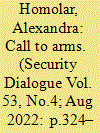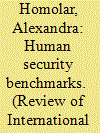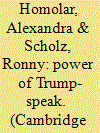| Srl | Item |
| 1 |
ID:
187116


|
|
|
|
|
| Summary/Abstract |
The rhetoric leaders use to speak to domestic audiences about security is not simply bluster. Political agents rely upon stories of enmity and threat to represent what is happening in the international arena, to whom and why, in order to push national and international security policy agendas. They do so for the simple reason that a good story is a powerful political device. This article examines historical ‘calls to arms’ in the United States, based on insights from archival research at US presidential libraries and the United States National Archives. Drawing on narrative theory and political psychology, the article develops a new analytic framework to explain the political currency and staying power of hero–villain security narratives, which divide the world into opposing spheres of ‘good’ and ‘evil’. Shifting the conceptual focus away from speakers and settings towards audience and affect, it argues that the resonance of hero–villain security narratives lies in the way their plot structure keeps the audience in suspense. Because they are consequential rhetorical tools that shape security policy practices, the stories political agents tell about security demand greater attention in the broader field of international security studies.
|
|
|
|
|
|
|
|
|
|
|
|
|
|
|
|
| 2 |
ID:
104331


|
|
|
|
|
| Summary/Abstract |
US Military Power
Post-Cold War US Defence Policy
Major Theatre Wars
Unipolar Era
|
|
|
|
|
|
|
|
|
|
|
|
|
|
|
|
| 3 |
ID:
142233


|
|
|
|
|
| Summary/Abstract |
When the United Nations Development Programme formally introduced the concept of human security in 1994, it was widely celebrated as a long-overdue humanist alternative to orthodox models of security. Today, human security is a buzzword for describing the complex challenges that individuals and communities face in achieving safety and wellbeing in an insecure world. This article directs attention away from the emancipatory and empowering qualities commonly ascribed to human security to explore, instead, the specific role of benchmarking within the wider human security agenda. The main focus here is on the ways in which human life has been operationalised, measured, and classified to create indicators that permit judgements about individual security and insecurity. The article argues that although a single global human security benchmark has yet to be established, the main indices used as performance metrics of human insecurity have produced a narrow understanding of what it means to live a ‘secure’ life and have reinforced the state as the main focal point of international security governance.
|
|
|
|
|
|
|
|
|
|
|
|
|
|
|
|
| 4 |
ID:
167602


|
|
|
|
|
| Summary/Abstract |
For most observers, the election of Donald Trump as the 45th president of the United States (US) came as a shock. This has been widely recast as the culmination of the American public’s long-standing dissatisfaction with the political elite and deep-seated frustrations with broader socio-economic conditions. We argue that the Trump campaign’s success also stemmed from its effective use of an emotionally charged, anti-establishment crisis narrative. With insights from political psychology, we examine the socio-linguistic mechanisms that underlie the effectiveness of ‘Trump-speak’ through both quantitative and qualitative content analysis of Trump’s communications toolkit during the 2016 US presidential election campaign. We show that his leadership legitimation claims rest significantly upon ‘crisis talk’ that puts his audience in a loss frame with nothing to lose and explain why ‘crisis talk’ impacts on political behaviour. As we demonstrate, the crisis stories that political agents tell simultaneously instil ontological insecurity among the American public and serve to transform their anxiety into confidence that the narrator’s policy agendas are the route back to ‘normality’. Through these rhetorical mechanisms, the Trump campaign manipulated individuals’ ontological (in)security as a tool in the politics of reassurance at the broader, societal level.
|
|
|
|
|
|
|
|
|
|
|
|
|
|
|
|
| 5 |
ID:
110784


|
|
|
|
|
| Publication |
2011.
|
| Summary/Abstract |
This article examines how the foundations of the 'rogue states' security narrative in the United States developed prior to the declaration of the George W. Bush administration's 'Global War on Terror' and President Bush's representation of Iraq, Iran and North Korea as an 'axis of evil'. The article argues that the puzzle of how US post-Cold War foreign and defence policy came to be focused on 'irrational' - but militarily inferior - adversaries can be understood through analysing how actors within the US defence community discursively constructed discrete international crises as the trigger for a major shift in US threat scenarios. This is developed through an examination of two crucial episodes in the construction of post-Cold War US national security interests: the crisis in the Persian Gulf in 1990-1 and the North Korean nuclear crisis in 1993-4. The article suggests the importance of historicizing contests over the interpretation of international crises in order to both better understand the process through which a country's national security interests are defined and to gain greater analytical purchase on how security narratives are reconstructed during processes of systemic change.
|
|
|
|
|
|
|
|
|
|
|
|
|
|
|
|